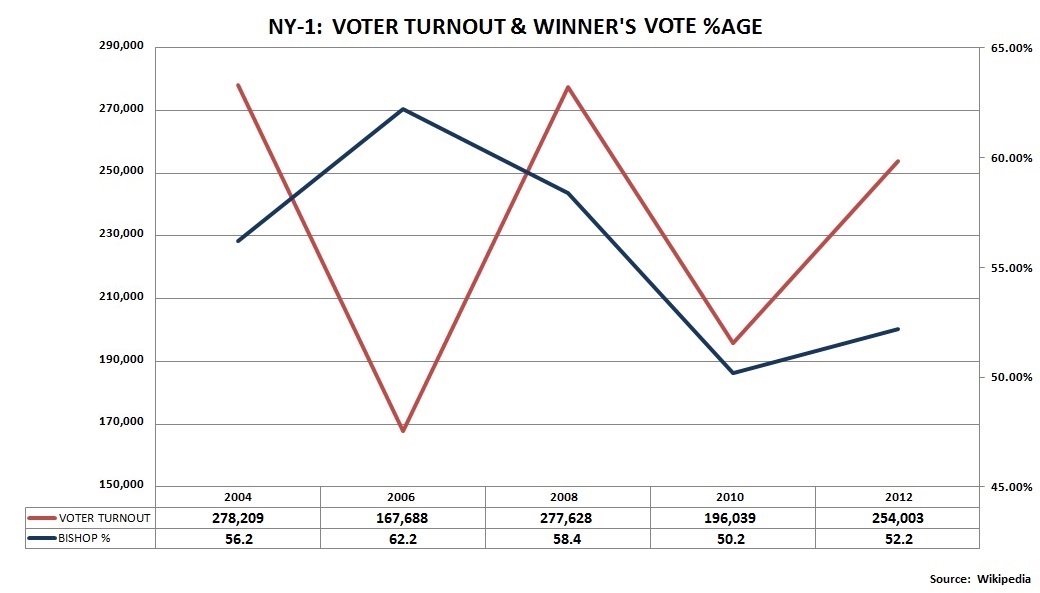All Eyes Are on New York's First Congressional District in 2014

New York’s First Congressional District, comprised of the central part and the eastern end of Long Island, includes affluent playgrounds like the Hamptons, working class neighborhoods like Smithtown and Mastic, and rural farming communities on the North Fork. It has seen its share of political swings, alternating narrow wins in presidential elections -- George W. Bush only beat John Kerry by a single point there in 2004, while Barack Obama did the same against Mitt Romney in 2012.
While the presidential elections have swung back and forth, incumbent congressman Tim Bishop has been able to win re-election since 2002. Bishop, who served as provost of Southhampton College before entering the halls of Congress, touts his advocacy for college access and affordability and his work in passing the College Cost Reduction and Access Act in 2007. The bill expanded student tuition assistance to families paying for college.
Bishop has been a reliable vote for the Democrats in Congress, voting for the Affordable Care Act and against its repeal. The website “On the Issues” characterizes Bishop -- based on his voting record -- as a “populist-leaning liberal.” He currently serves on the congressional Transportation and Infrastructure Committee and the Education and Workforce Committee.
In 2012, Bishop was dogged by pay-to-play allegations that alleged he solicited a campaign contribution from hedge fund magnate Eric Semler in return for assistance expediting permits for a “Hamptons bar mitvah fireworks display.” Bishop denied the allegations, but Semler said that he did receive a request for a donation from Bishop’s campaign (specifically from Bishop’s daughter and fundraiser, Molly) after Bishop helped get the permit.
Bishop may meet an old foe in N.Y. State Senator Lee Zeldin, who comes to politics from a military background. Currently a Major in the Army Reserves, Zeldin served as a Military Intelligence Officer, Federal Prosecutor, and Military Magistrate while on active duty. He was deployed to the Middle East as a paratrooper with the 82nd Airborne Division in support of Operation: Iraqi Freedom.
Zeldin unsuccessfully challenged Bishop in 2008. Six years later, Zeldin returns to run again. This time, he is as a rising conservative star, having unseating Brian Foley from the State Senate in 2010. In Albany, Zeldin led the charge to repeal the MTA Payroll Tax on employers and sponsored legislation to enact the nation’s strongest property tax cap, which was signed into law by Governor Andrew Cuomo.
As one would guess, Zeldin has also sponsored legislation benefiting veterans, securing funding to help returning veterans with post-traumatic stress disorder (PTSD) and sponsoring a law that would prevent protests at military burials.
Before Zeldin can look to a second showdown with Bishop, he will have to win a primary against two-time candidate George Demos. A former SEC prosecutor, Demos ran for Congress in 2010 and 2012, losing a primary in the former and withdrawing from the latter.
But, this does not mean that Demos should be taken lightly.He recently claimed to have over $2 million in his campaign coffers, mostly from loans he personally made to his campaign. The source of the funds has become a matter of controversy in Republican circles. N.Y. Republican Chairman Ed Cox called Demos’ campaign “political malpractice” while blasting him for allegedly using his father-in-law’s money and his connections to U.S. House Minority Leader Nancy Pelosi.
Demos’ campaign, of course, denies any such connection.
In the last few election cycles, a few trends have emerged. Overall, the volatility of voter turnout for the NY-1 election between presidential election cycles and mid-term elections is notable. Anywhere from 60,000 to 100,000 voters stay home during mid-term elections in NY-1 simply because the presidency was not at stake. Voter turnout in mid-term elections has been on the rise in the last two cycles.
Congressman Bishop is a battle-tested incumbent, but his margin of victory has dwindled since 2006. In fact, Bishop was nearly unseated in the Republican resurgence of 2010 when it took months of re-counts and court proceedings to win. Bishop did do better against the same opponent in 2012 with President Obama at the top of the ticket. However, it seems clear that a well-funded candidate with the name recognition that Zeldin possesses could pose an even bigger threat to Bishop’s job than his 2010 challenge.
For State Senator Zeldin, the challenge seems obvious: get past the primary with enough money on hand to win. Given the tenor of Demos’ past campaigns (his 2010 primary battleturned negative and degraded until the primary election) and the aggressive posture that the Republican establishment has taken early on, a fierce primary is on the horizon. Zeldin just needs to win and have cash to spare, because he has already shown he can unseat Democratic incumbents.
Demos is the fly in the Republican ointment. In a primary, lack of establishment support makes a win an uphill climb. Couple that with his past unsuccessful attempts at politics, and primary voters may be left with a negative impression. But, Demos’ cash on hand can be used to nullify these challenges. How he spends it will determine whether he has any shot.
If recent history is any judge, the nation’s eyes will once again be fixed on the eastern end of Long Island for yet another protracted political tangles.




